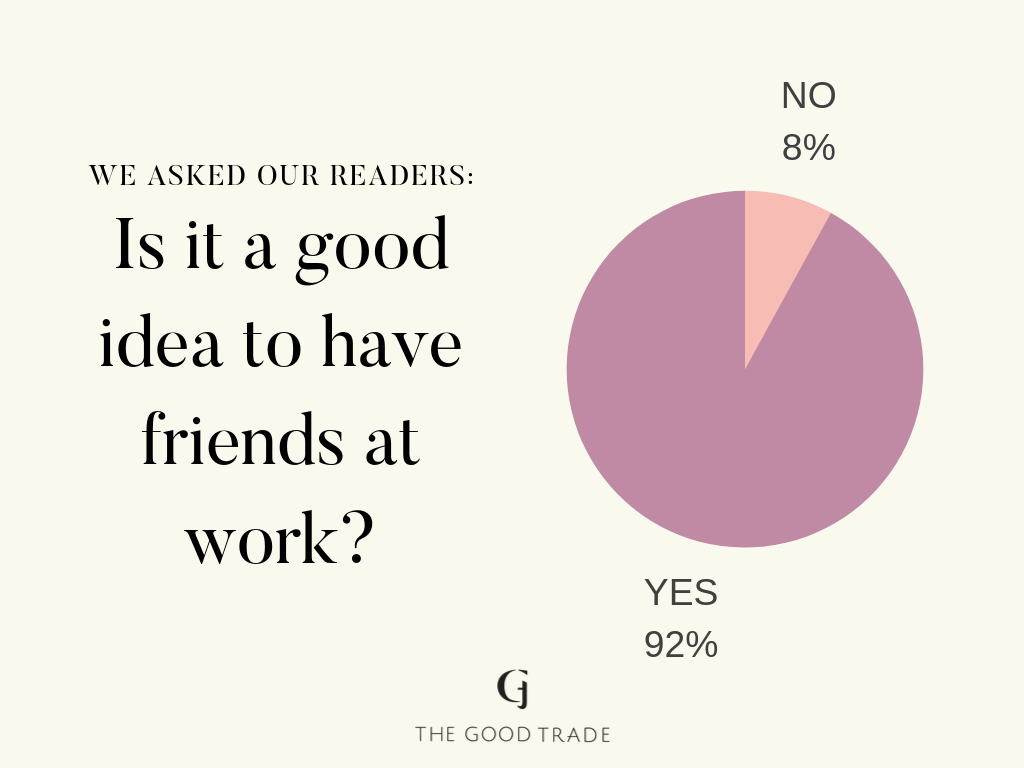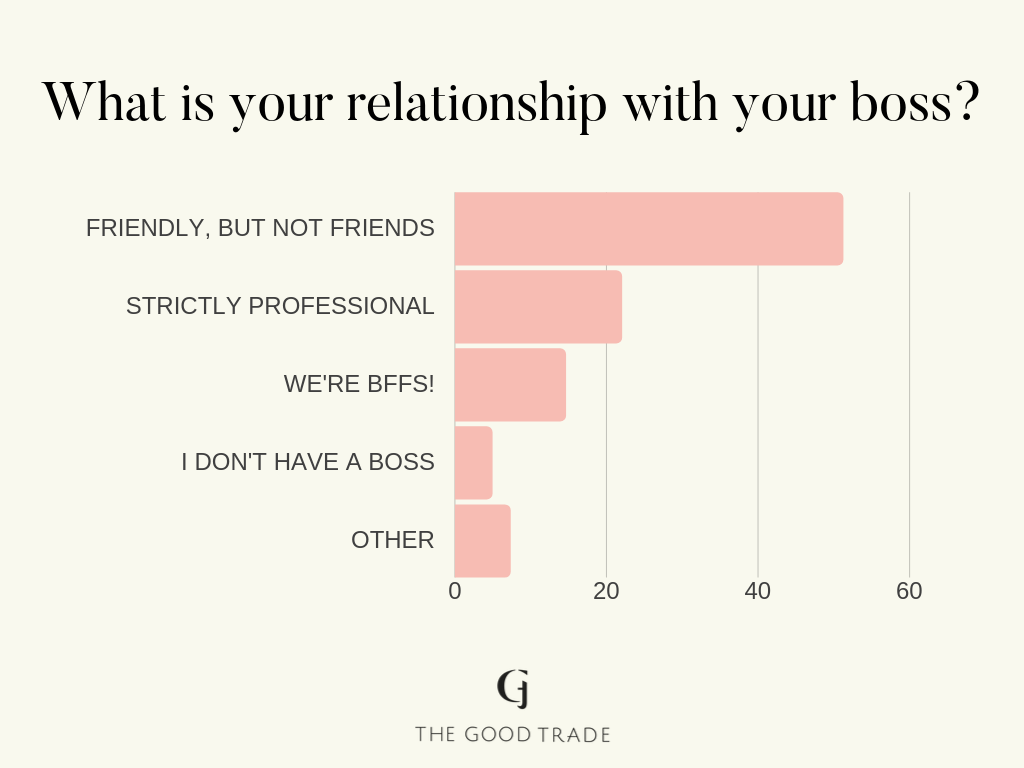
Should You Be Friends With Your Boss?
The Modern Social Workplace
For an introvert like me, a mildly social workplace is a blessing: a structured place that allows me to build trust and friendships with people working to accomplish the same goal? Yes, please. For others who build friendships more easily outside of structures like work, maybe the question of how close they should be to their boss or coworkers is moot. For me, though, I am continuously in the process of outlining my personal boundaries in the workplace.
I’ve had bosses I would go out and drink with during and after office celebrations; bosses I tried way too hard to be close to; bosses I’ve forgotten. Although I’ve never spent significant unsanctioned work time with either a manager or employee, it’s easy to see how those lines can become blurred. Social media, vulnerability in the workplace, and an increase in flexible, casual work environments are all directing us towards closer relationships with our colleagues for better or for worse. In fact, Udemy’s recent Workplace Boundaries Report shows that 37 percent of employees feel that workplace chat or messaging has become too informal—among other indicators that not everyone is on board with the increasingly casual workplace.
So what does it all mean for our relationship with our bosses, and how can we approach these relationships tactfully?
Can You Be Friends With Your Boss?
We asked our readers in The Daily Good about their workplace friendships—and what they told us was overwhelmingly positive. Out of 125 survey participants, 92 percent indicated that they felt it was a good idea to have friends at work. (With good reason—workplace satisfaction does have impacts on our health, especially our mental health).
But things sounded a little different when we asked about our readers’ relationships with their bosses. Just under 15 percent of respondents shared that they were good friends with their managers; and just over half of the respondents shared that their relationship with their boss was friendly, without going so far as to say they were friends.
“Your boss can be your “work friend,” but that’s different than your “social friend.” At the end of the day, their job is to focus on the performance of the team as a whole.”
“The word we should focus on is ‘friends,’ because most people think of their friends as social acquaintances that they hang out with outside of work,” says Lauren McGoodwin, the founder and CEO of the career website Career Contessa.
“I think your boss can be your ‘work friend,’ but that’s different than your ‘social friend.’ At the end of the day, their job is to focus on the performance of the team as a whole and not just the individual.” So, friends? Maybe not. But friendly? Definitely.
Managers Set The Tone
Understanding your manager’s role and what’s at stake for the team and company as a whole is essential to start building boundaries. But the tone is most easily set by the managers, and it’s helpful to look to them for cues about social boundaries. Because, when it comes to a manager being close to her employees, McGoodwin says, “If the performance as a whole team is struggling because of [a friendship with an employee], it’s much harder to: 1. See it; 2. Address it; and 3. Be the boss, the person who the rest of the team needs versus prioritizing that friendship”
“There’s nothing wrong with sharing your life with your team, but it’s important to ensure that the work you’re doing isn’t getting derailed because of it.”
If you’re the manager, the team is going to follow your example, whether you have explicit rules around social relationships or not. For example, if you’re highly engaged with everyone you manage on social media, the team will follow suit—and that may not always be a good thing. There’s nothing wrong with sharing your life with your team, but it’s important to ensure that the work you’re doing isn’t getting derailed because of it.
How to Build a Better (Professional) Relationship With Your Boss
Of course, while the onus of establishing boundaries lies heavily on the manager, you may find yourself in an exceptionally casual workplace where those boundaries are more blurred.
If you’re in the fortunate position of having a leader you admire and want to build a better working relationship with, there are some things you can do to show up. “If you want to be closer with your boss, be a good employee,” says McGoodwin. “Be an honest, trustworthy employee. It evolves from there as you share experiences. But the bond can stay professional.”
McGoodwin also explains what really builds trust in a manager/employee relationship, and it’s not friendliness or vulnerability. “What builds trust is predictability. Someone says that they’re going to do something and they do it. Vulnerability, on the other hand, shows that you’re a real person and that you’re allowed to have a bad day—but do bad days create trust among people? Trust is more about meeting expectations.”
“Facing challenges and successfully solving problems together is what builds your relationship—not telling each other your deepest secrets.”
So meet your manager on that professional level; create shared goals for your role and for your team. Celebrate milestones and accomplishments thoughtfully as a group. Facing challenges and successfully solving problems together is what builds your relationship—not telling each other your deepest secrets.
Another practice I’ve found helpful has been to ask for feedback clearly and consistently. When I’m on friendly terms with a boss, I still want to ensure that I’m getting the (sometimes tough) feedback that will help me grow in my career. And that’s just it: indicating that you’re on board to prioritize the team and your work over an intimate personal relationship opens the door for a flourishing professional relationship.
So how close can you be to your boss? Ultimately, McGoodwin explains what boundaries have felt right for her: “Maybe you and your boss go get a coffee during the day, but maybe you don’t go get drinks after work. Maybe you tell your boss what you’re doing during the weekend, but you don’t invite her to it.”
“Maybe you and your boss go get a coffee during the day, but maybe you don’t go get drinks after work. Maybe you tell your boss what you’re doing during the weekend, but you don’t invite her to it.”
It’s all about balancing who you are as a person with your role in the workplace. And if you’re looking for more emotional support than your current boss is showing you? It may be time to seek friendships outside of work—or a therapist.
Beyond thinking more critically about how we interact with our bosses and managers (and employees!) at work, it’s also essential to break down the gender component to this conversation. My closest working relationships have primarily been with female managers—women whom I deeply admire—and noticeably absent in my relationships with male managers. So as you’re exploring this question yourself and find a disparity based on gender, ask yourself, “Do I hold an expectation that a female boss is friendlier or more empathetic than a male boss?” This conversation extends beyond interpersonal relationships and into the realm of gender and emotional labor in the workplace. Be mindful, and challenge your own expectations if you notice those patterns in your behavior.
How close are you to your boss or your employees? Share what boundaries work for you in the comments below!
RELATED READING
Emily Torres is the Managing Editor at The Good Trade. She’s a Los Angeles transplant who was born and raised in Indiana, where she studied Creative Writing and Business at Indiana University. You can usually find her reading or writing, caring for her rabbits, or practicing at the yoga studio.




